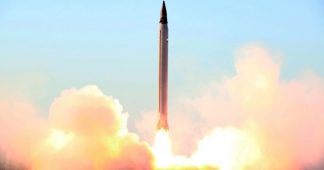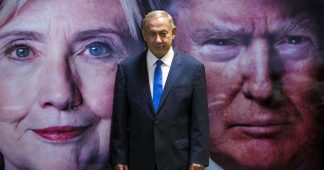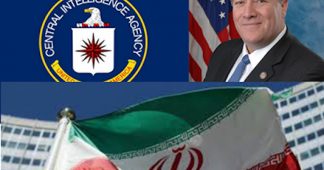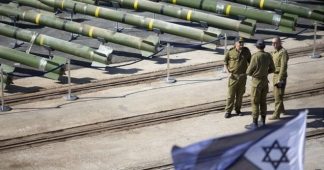By Keith Jones
Iranians will vote Friday in the country’s quadrennial presidential election under conditions of mounting geopolitical tensions in the Middle East and beyond.
The Trump administration, the Pentagon and broad sections of the US political establishment are bristling with opposition to Iran, which they deem an impediment to their drive to overthrow Syrian President Bashar al-Assad and establish unbridled US dominance over the oil-rich Middle East.
Israel and Saudi Arabia, Washington’s closest regional allies and the first stops on Trump’s impending foreign tour, continue to threaten Iran. Israeli Housing and Construction Minister Yoav Galant called Tuesday for Israel to “assassinate Assad” and then attack “the head of the serpent which can be found in Tehran.” Earlier this month, Saudi Defense Minister and Deputy Crown Prince Mohammad bin Salman ruled out dialogue with Tehran and said he was working to ensure the “battle” with Iran will be waged “in Iran,” not the Saudi homeland.
Officially, there are four candidates in Iran’s presidential race, two others having dropped out this week. But only the incumbent, Hassan Rouhani, and Ebrahim Raisi, a former attorney general who heads a major religious foundation, have any chance of winning. Although Raisi has never before stood for elected office, he reputedly has the support of the leadership of the Revolutionary Guards and more socially conservative sections of the Shia clergy.
Rouhani is touting the nuclear accord Iran reached with the major powers (the US, Russia, China, Britain, France, Germany and the European Union) in 2015 as his administration’s premier accomplishment.
Under the accord, Tehran agreed to dismantle or freeze large parts of its civilian nuclear program in exchange for the lifting of punishing US-led and European-backed economic sanctions that had crippled Iran’s economy.
All the candidates are committed to supporting Iran’s continued adherence to the nuclear accord. However, Raisi and Tehran Mayor Mohammad Bagher Ghalibaf, who withdrew from the presidential race to endorse Raisi last Monday, have pointed out that few of the economic benefits Rouhani and Foreign Minister Javad Zarif claimed the accord would bring have materialized.
There has been an uptick in economic growth, as Iran’s oil exports, which were more than halved by the sanctions, have rebounded, and Tehran gained access to tens billions of dollars of its own money that were frozen in the world banking system.
But foreign investment has flagged and in 2016 the official jobless rate rose to 12.5 percent. Youth unemployment is more than double that.
As Rouhani and Zarif hoped, European business and political leaders flocked to Iran when the nuclear accord officially took effect in January 2016 so as to scout out the government’s promises of an Iran “open for business,” including a more investor-friendly regime in the energy sector and special concessions for European energy companies.
However, few European investments have followed. While Europe’s depressed economy is a factor, the principal reason is that European companies, especially its banks, are terrified of running afoul of Washington’s “secondary” anti-Iran sanctions regime. In the name of human rights, antiterrorism and derailing Iran’s ballistic missile program, US sanctions continue to target large sections of Iran’s economy. According to the Financial Times, so robust are America’s secondary sanctions, “the Iranian economy desperate for investment, jobs and technology transfer is…practically cut off from the global banking system.”
Added to this is the extremely volatile geopolitical situation in the Middle East. With the US, to say nothing of many of the European powers, seeking to overthrow Iran’s only regional governmental ally, the Assad regime in Syria, European companies are worried that events in Syria or elsewhere could rapidly lead to an escalation of tensions between Tehran and Washington, leaving their investments stranded.
As part of his reelection campaign, Rouhani has promised he will negotiate an end to all US sanctions during his second term. However, he has not said a word about how this will be achieved.
The US political establishment, Republican and Democratic alike, has made clear that this would require Tehran to surrender across the board to US imperialism’s strategic demands. The Trump administration, meanwhile, has made clear it has Iran in its crosshairs.
Only grudgingly did Trump and Secretary of State Rex Tillerson acknowledge last month that Iran has fulfilled its obligations under the nuclear accord. Even as they did so, they served notice that they are seeking the appropriate geopolitical conjuncture to ratchet up pressure on Iran.
Trump has accused Iran of “not living up to the spirit of the (nuclear) agreement,” while Tillerson has resurrected US claims that Iran is seeking to become a nuclear state and accused it of exporting “terror and violence.”
During a recent televised debate, Raisi attacked Rouhani for showing “weakness in the face of the enemy.” He has also sought to appeal to socioeconomic discontent. Toward that end, he has promised to increase taxes on the rich and to triple, for the three lowest income deciles, the meager cash handouts that are given Iranians in lieu of the subsidies on fuel and food prices Rouhani and his predecessor, Mahmoud Ahmadinejad, phased out.
In an interview with Reuters, Saeed Leylaz, an economist associated with the “reform,” or pro-Rouhani, political camp, said, “Though unrealistic, (Raisi’s) promises will surely attract millions of poor voters.”
Rouhani’s support comes disproportionately from the more privileged sections of Iranian society. This includes those bourgeois and upper middle-class layers that supported the “Green movement,” which challenged Ahmadinejad’s reelection in 2009 on the basis of unsubstantiated claims of voter fraud, in the hopes of bringing to power a government that would reorient Iran toward the US and slash government spending on poorer sections of Iranian society.
Soon after assuming office in 2104, Rouhani invited the IMF to return to Iran, stepped up privatization, and further slashed social spending.
Rouhani and his supporters have made much of Raisi’s role in the mass executions of political prisoners in 1988, including thousands of Tudeh (Communist Party) members and other leftists. Raisi was one of four Islamic Republic judges who sanctioned and supervised the killings.
But Raisi is not the only one with blood on his hands. The entire clerical political establishment, including Rouhani’s mentor, the recently deceased former president Hashemi Rafsanjani, Green leader Mir-Hossein Mousavi and Rouhani himself were complicit in this crime.
According to reports in the pro-Rouhani Western media, the election race has grown tighter in recent days. This is reflected in the streets, with the rival camps mobilizing tens of thousands of supporters at rallies in the campaign’s final days.
Iran’s ruling elite is itself deeply divided. Rouhani speaks for those sections eager for close ties with the Western imperialist powers, beginning with Germany, France, Italy and the other states of the European Union. Their hope, although rarely publicly articulated for fear of provoking mass opposition, is that ultimately Iran will become a junior partner of US imperialism, resuming the role it played under the bloody dictatorship of the Shah, when Tehran served as Washington’s principal regional ally.
Other sections favor a more confrontational stance with Washington based on their calculation that the US will not accommodate the Iranian’s bourgeoisie’s regional-power aspirations, not least because this would require that Washington downgrade the status of its chief local clients, Israel and Saudi Arabia, and potentially that of Turkey as well.
The divisions over Iran’s strategic orientation are tied to definite economic interests. Those backing Rouhani tend to be more traditional sections of the bourgeoisie, including those who developed close ties with Europe during the 1990s, when Tehran embraced the IMF and rolled back many of the concessions made to working people in the aftermath of the 1979 revolution that toppled the Shah.
A considerable section of their opponents has ties to the network of companies, many of them privately owned, associated with the Revolutionary Guards, or commercial ties to Russia and China that allowed them to profit from “sanctions busting.”
Ayatollah Khamenei, the Islamic Republic’s theocratic supreme ruler since 1989, has long played a Bonapartist role. During the 1990s and in the first years of the Bush administration, he repeatedly authorized overtures to the US. Later, he backed Ahmadinejad, who appealed to popular anger over rampant social inequality and made a very public showing of defying Washington by expanding Iran’s civil nuclear program.
Fearing the explosive social consequences of Iran’s deteriorating economy, Khamenei subsequently switched gears again at the conclusion of Ahmadinejad’s second term. He supported Rouhani’s pursuit of a nuclear deal with Washington and once the accord was reached ordered the regime, and specifically the Revolutionary Guards, to close ranks behind it.
However, Khamenei was careful—like Obama, only with the roles reversed—to describe the nuclear deal as a test of US good will. More recently, he has been highly critical of the continued US sanctions on Iran.
Apparently with Khamenei’s approval, if not at his behest, the Guardian Council, a body staffed by specialists in Islamic law and charged with vetting election candidates, prevented Ahmadinejad from challenging Rouhani in Friday’s election.
As in past presidential elections, Iran’s supreme leader has indicated no preference. But he has made repeated calls for a strong turnout, saying it will be a testament to the strength of the Islamic Republic.
Europe’s governments and corporate media are eager to see Rouhani reelected, as is much of the US and political establishment. There is a minority faction, however, that would welcome his defeat, because they calculate it could be exploited to scuttle the nuclear accord and ratchet up tensions with Iran. Yesterday, the Wall Street Journal published a column by an ex-CIA Iran expert, Reuel Marc Gercht, titled “In Iran’s election, Americans should root for the ‘hard-liner.’”











